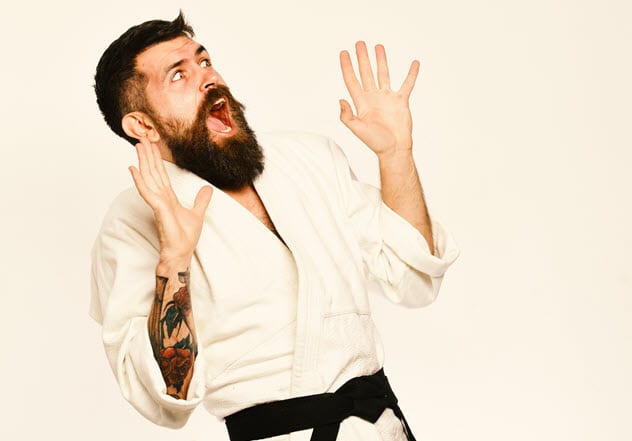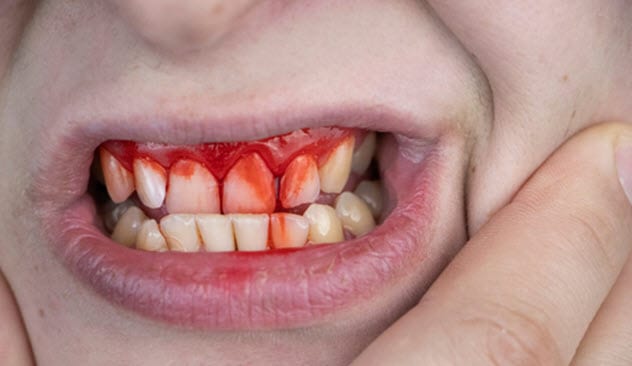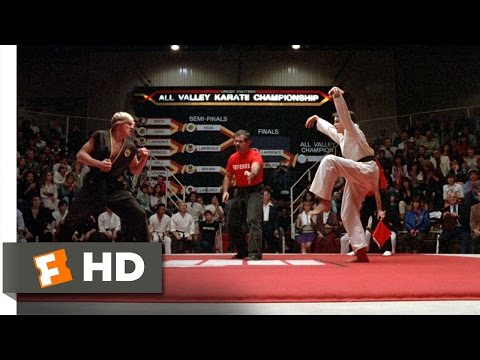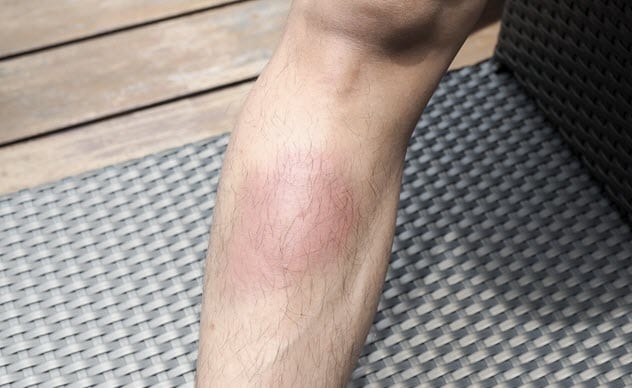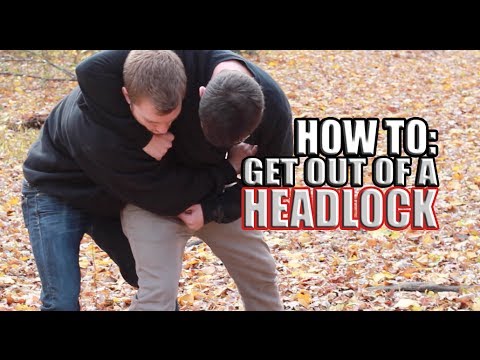See Also: 10 Rough-And-Tumble Fist Weapons We are relatively vain about our own skills and have been hearing tips about hand-to-hand combat our entire lives. So we figure we have a bit of an edge. However, many tips and beliefs about hand-to-hand combat are simply inaccurate. They could get you in trouble in a truly dangerous situation.
10 Fighting Multiple People Is Just About Impossible
For anyone who has trained against several individuals at a time, watching someone fight a crowd of people in an action movie is always laughable, especially if the others are skilled. The most effective strategy is running and fighting, mostly in a circle, which is almost your only hope. You must keep fighting the current speed leader closest to you. Maneuver away from the rest, putting the one you are fighting between you and them.[1] Of course, this is not an easy strategy. It requires constant movement on your part, usually close to full-out running while fighting at the same time. Most people cannot keep this up very long even against just a few people. If you are in an enclosed space with little room to run and several people are fighting against you, there comes a point where training hardly matters. They can just surround you and pin you down. You can only throw your hands in so many directions at once in a short amount of time.
9 Besides Fight Or Flight, There Is Freeze
Many people have heard of the fight-or-flight response, so they wonder how they will react in combat. Some people train in the hopes that they will be better prepared. But it can be hard to imagine how you will react in a truly traumatic or dangerous circumstance. If you have already experienced such a situation, you might have some clue because you are more likely to behave like you did before. But this isn’t always the case. Your feelings or circumstances in that instance could affect your response. Besides fight or flight, a third factor is freeze.[2] Many people completely forget that last one at their peril. In some situations, certain individuals will react to something scary or dangerous by freezing in fear like a deer in the headlights. Of course, this is usually not the best instinctive response when you’re attacked.
8 Some Popular Spots Aren’t Really The Best Places To Hit
Many people are confused about the best spots to hit your opponent’s body. People will often give “tips” on these issues and steer you in a dangerous direction. For example, some people think it is smart to hit someone in the mouth. They probably saw it in the movies, where slo-mo shots of someone’s teeth getting knocked out look really cool. However, they don’t usually show you that the puncher’s hand has been horrifically mangled. Teeth are hard. So if you are chipping teeth, then you are almost certainly hurting your hand. People are often advised to strike up under someone’s nose because it will allegedly “send the cartilage into their brain and kill them.” This isn’t true. You’ll probably get hurt by trying to make such a precision shot in the middle of a fight. It definitely is not a “kill shot.”[3] Other commonly suggested spots are the groin or the knees, but they aren’t always so easy to hit. It’s hard to get your feet high enough to hit another person’s knees without them noticing and then moving or blocking. If you go for the groin, you have even more of a problem with reach. If you try to punch the groin, you’re making a downward motion and leaving yourself exposed. Besides, your opponent will probably closely protect that area, making it a bad target for quick strikes or jabs.
7 Breaking Boards Depends Almost Entirely On Mental Training
If you’ve ever seen a martial arts demonstration, you’ve almost certainly witnessed people breaking concrete blocks, boards, or stacks of concrete blocks or boards. Some individuals will cheat and use breakaway boards for a more impressive display. But most martial arts practitioners won’t because it really isn’t that hard to do physically—at least not with boards. Most of us assume that it takes years of training to develop the perfect striking power and technique. It probably doesn’t hurt to build up a bunch of calluses first, either, or so we think. However, many up-and-coming black belts break boards in their first class or two. Apart from a little bruising, they are fine. You might imagine that “this is because they are black belts.” But this training is new to them, and it is mostly mental. Your hand is actually quite strong, and many boards are weak enough to be broken without any special hand techniques or striking motion. Of course, more skill and training can help, but the key to success is mainly a psychological process. Pain and danger signals in your brain will tell you to “stop” when you hit the board. The true training? Simply force yourself to move past that mental barrier and allow your hand to keep striking instead of instinctively bouncing back.[4]
6 All Your Cool, Collected Skill May Only Do So Much Good Against A Novice’s Adrenaline
Sometimes, you hear stories of a martial arts master going up against a big drunk or some random guy who thinks he’s a great fighter. Everyone expects the expert to win big. But then he gets stomped, and people wonder what happened. Some witnesses may begin to believe that martial arts is mostly useless. But they are forgetting that adrenaline can give your opponent a huge boost in strength and endurance.[5] Adrenaline is often released when someone is in danger. This can give that person incredible bursts of energy and physical strength. Even if you’re a perfect zen master, it may help to get a bit angry, believe that you might lose, and become somewhat scared of it. Just stay mostly in control of your emotions. A little adrenaline-induced strength and ability to temporarily ignore pain may help you—and hurt your enemy. However, there are limits even if you are skilled. If your opponent is quite large—especially if he is bigger than you—and he is amped up on adrenaline, you cannot count on your skill to rule the day. Run!
5 Knockouts Are Incredibly Serious
One trope in movies, books, and other media has always been someone being knocked out by the bad guy and waking up later—sometimes hours later. This has been done so many times that a lot of people don’t understand just how serious and unrealistic these scenarios are. In real life, getting knocked out is fairly hard. Even boxers who are tired from a long fight usually only stay out for seconds after a bad knockout. However, it’s truly dangerous when someone has been out for several minutes at a time. That person needs to go to the hospital as soon as possible and get his brain checked in almost every imaginable way. If he has been out for hours, it is very unlikely that he will get back up. If he does, there is almost always permanent damage to his brain function and his ability to live normally.[6]
4 Most Sparring In Martial Arts Practice Is Poor Training For Real Combat
After most people see martial arts movies like The Karate Kid, they have distorted ideas about fighting. Sparring tournaments are generally silly because they don’t allow kicks—Daniel-san would have been disqualified in real life—and you can’t do much below the belt except for a few low sweeps. Watch this video on YouTube Strikes to the head are also restricted, and people wear thick, padded helmets and gloves. This leads to a unique “for fun” competitive fighting style that would get you destroyed in a real fight, especially in something like mixed martial arts. Many karate schools focus too much on these sparring methods, which do a poor job of properly teaching kids how to fight. In a real fight, you can kick, punch, and strike anywhere on the head or below the belt. You can also fight dirty (aka “be dishonorable”), a tactic that may help you win. While it may be fun in movies to talk about zen and honor, you should focus on your own safety and survival in a real fight.[7]
3 The Many Weak Spots On The Body
Certain weak spots on the body make especially good targets even though most people don’t realize it. One example is the shins. A good swing at the shins doesn’t require you to move your foot enough to telegraph it (and make it easy to block). In fact, you can get a strong hit without much room to maneuver. A good kick to the shins will strike the bone hard and leave your opponent smarting. This will give you a chance to escape or take advantage of another opening. When hitting someone on the head, the throat and eyes are really your best targets. It may not seem “honorable,” but it is effective. A quick jab to the throat requires very little strength or skill on your part to be effective. Ditto for an eye.[8] If you can only get the side of the head, go for one of the temples and try to get your knuckle in there real good. And if you want to wear your opponent down and find an opening, but you just cannot see one? Go for his forearms. The pain will quickly wear him down, and his arms will become incredibly sore very quickly.
2 The Most Important Thing Is How To Break Holds
You may be a skilled fighter with massive experience. You may even have adrenaline on your side. However, if a bigger, stronger opponent takes you to the ground or grabs you, then you’d better get good at breaking holds really fast—or you’re going to be in a lot of trouble. Many attackers, especially if they’re much bigger than you, will grab you from behind or try to tackle you and get you on the ground. This will be a larger person’s greatest advantage. So you must be able to get out of holds before your opponent gets you on the ground. If they manage it anyway, you need other techniques to escape those holds.[9] For this reason, many martial arts schools teach generic grappling techniques and hold-breaking moves for most scenarios, even if it isn’t traditionally part of that martial arts repertoire. No matter what else you learn about fighting, you should know how to break out of things like a headlock or a bear hug.
1 Do Whatever Is Necessary To Win
Earlier, we mentioned that it’s good to strike the throat and the eyes. But some people are simply too squeamish to do that. So, before you get into a potentially dangerous situation, you should go over what you are capable of doing and what kinds of weapons you can use. For example, if you are going to bring a small device with you for gouging out the eyes of your attacker, you had better be ready to use it when assaulted. Otherwise, in your moment of weakness, your opponent might grab your weapon and use it against you. One of the greatest skills to have in a fight is a “killer instinct.” Now, we don’t mean that you want to kill people or have bloodlust. However, in the moment, that instinctive willingness to do serious harm to another person to save your own life or those of your loved ones is often your greatest edge.[10] Interestingly, most people truly are peaceful throughout their lives and rarely get into random fights with strangers. So they will not know how much of that instinct they really have until push actually comes to shove.

